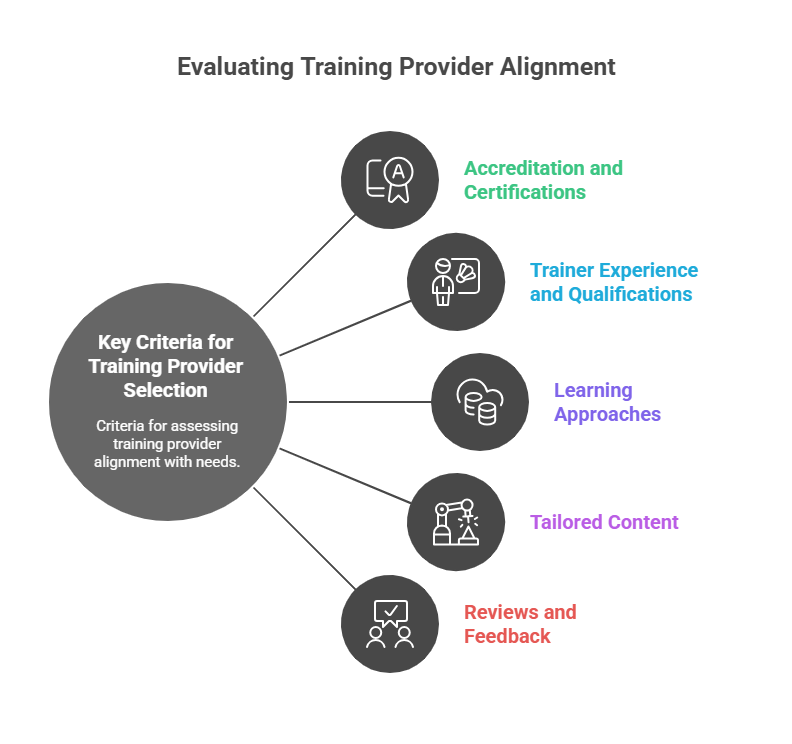
Key Takeaways
- Selecting the right corporate training provider is critical for aligning employee development with business strategy and goals.
- Asking the right questions — from trainer experience to customisation and post-training support- ensures relevance and impact.
- Evaluate providers on accreditation, industry expertise, content quality, and delivery methods to avoid ineffective training outcomes.
- Customised, engaging programs tailored to your industry needs boost knowledge retention and long-term performance improvements.
- Transparent costs, flexible schedules, and measurable outcomes are key factors for maximising ROI from training investments.
- Partnering with an experienced, diagnostic-based provider like Thriving Talents ensures tailored, future-proof training solutions that drive real business results.
Introduction
Today’s global corporate landscape is rapidly evolving. With the evolution of new digital transformation technologies, enterprises need every edge they can get.
In this dynamic environment, corporate training is fast becoming a strategic necessity to stay future-ready!
Beyond improving business efficiency, corporate training ensures that employees access new information and capabilities.
In fact, corporate training is now indispensable in supporting long-term strategic goals, increasing productivity, and fostering innovation. The process of choosing the best partner, however, can be overwhelming and time-consuming.
To guarantee alignment with the goals of your organisation, several important variables should be carefully taken into account when evaluating a training provider.
In this blog, we shall discuss key questions to ask when evaluating different prospective corporate training providers. These questions should provide decision support to ensure you maximise the return on your training investment and achieve sustained business success.
Importance of choosing the right training provider
Identifying the right corporate training provider is essential for entities looking to maintain a competitive edge and promote ongoing staff development. To guarantee that training activities align with corporate objectives, a reputable provider offers up-to-date industry knowledge and efficient instructional methods.
This alignment results in enhanced employee performance and higher engagement, which directly contributes to organisational growth. The right provider can also provide customised programs, extending the training’s impact and relevance whilst delivering quantifiable outcomes.
Conversely, selecting a poor training provider can have significant negative consequences. Poorly designed or irrelevant training programs may result in wasted resources, disengaged employees, and missed opportunities for growth.
Outdated training materials and a lack of customisation can also hinder skill development. Thereby, reducing employee morale and ultimately impacting productivity and profitability.
For more reading, check out: Types of Corporate Training Programs: A Complete Guide for HR Professionals.

Key criteria for training provider selection

When choosing a training provider, it’s imperative to have parameters by which to assess alignment with your organisation’s needs and objectives. By systematically weighing these parameters, one can make an information decision on a prospective training provider.
For instance:
- Ensure the provider is accredited and holds relevant industry certifications, guaranteeing up-to-date training programs.
- Assess if trainers are experienced and hold relevant certifications. Providers with unqualified training staff can compromise training effectiveness.
- Evaluate if prospects maintain diverse, engaging, and practical learning approaches, rather than purely lecture-based methods. Ineffective training methods can result in poor knowledge retention and practical application.
- Investigate if the provider possesses the ability to tailor training content to an organisation’s industry context for maximum impact and relevance.
- Watch out for poor reviews of training providers. These often indicate issues like low-quality content, poor delivery, or inadequate support.
13 questions to ask a corporate training provider
When evaluating prospective corporate training providers, it’s critical to ask specific questions to ensure their programs closely match your company culture and strategic goals.
Here are some questions to ensure that any selected training provider not only delivers quality content but also drives sustainable business growth.
1. What experience do your trainers have?
This question evaluates the trainers’ credentials and level of experience. Seasoned instructors with pertinent industry experience and credentials will likely provide successful outcomes. In essence, inexperienced trainers might not deliver the depth of instruction your company needs.
2. Can you provide references from past clients?
Asking for references verifies the reliability and performance history of a provider. Reliability is typically substantiated by positive feedback and case studies from similar firms previously served. Overall, good ratings and references offer you assurances that the training will live up to your expectations.
3. What is the trainer-to-participant ratio?
To ensure students receive enough individualised attention, it’s critical to understand the trainer-to-participant ratio.
Learning results can be greatly improved by smaller groups since they usually allow for greater interaction, more individualised feedback, and improved engagement.
Lack of trainers in large groups might result in inefficient training techniques and lower participant engagement.
4. Do you offer customised training solutions?
It’s imperative to inquire with any provider: ‘can you tailor training content to our needs?’ Customised programs that address industry-specific challenges are more relevant and impactful, addressing unique skill gaps and strategic goals.
Providers unable to adapt their content may deliver generic training that lacks applicability and value.
5. What are your training delivery methods?
Inquiring whether training is delivered via e-learning, in-person, or hybrid helps determine suitability for your workforce’s preferences and logistical needs.
Remember, effective delivery methods should always engage participants and accommodate disparate learning styles. Contrarily, rigid or outdated methods may hinder knowledge retention and application.
6. What types of training materials do you use?
An evaluation of the quality and diversity of training resources—such as case studies, workbooks, or videos—indicates how useful the instruction will be.
High-quality materials support better comprehension and skill application, whereas training effectiveness may be diminished by subpar or out-of-date content.
7. How do you measure training success?
Always inquire: ‘what is your approach to evaluating training effectiveness?’ This question revolves around quantifiably assessing the efficacy of training. It reveals how the provider tracks learning outcomes.
For example, through assessments, feedback, or performance metrics. Quantifiably measuring success ensures the training delivers genuine value and helps justify the investment.
8. Do you offer assessments or certification?
Certification provides staff and the company with concrete evidence of learning by validating training involvement and skill development. Assessments are a crucial factor in motivation and responsibility because they also aid in identifying knowledge gaps and reinforcing learning.
9. How do you handle specific industry needs?
This inquiry probes the provider’s capacity to handle particular technological, cultural, or regulatory facets of your industry. Providers familiar with your industry are more likely to deliver more relevant content and practical examples. It enhances training impact and avoids generic approaches that may overlook critical nuances.
10. How do you ensure engagement during training?
Effective learning dictates the use of engagement techniques, including group discussions, interactive exercises, and real-world case studies.
In practice, passive or lecture-heavy sessions usually result in poor recall and practical application. As such, experienced providers should be able to innovate and try experiential ways to keep participants engaged and motivated.
11. How flexible are your training schedules?
Scheduling flexibility minimises disruption by accommodating employees’ availability and operational demands. Maximum participation and convenience are ensured by providers who offer dynamic scheduling options or on-demand sessions.
12. Can you provide a breakdown of training costs?
Pricing transparency allows companies to project, plan, and compare budgets accurately. Pricing should be detailed to include materials, assessments, or follow-up support. This helps avoid hidden fees whilst ensuring the training investment aligns with the company’s financial expectations.
13. Do you offer post-training support?
Post-training support, like refresher sessions or access to resources, reinforces learning and helps sustain skill application over time. In contrast to one-time training sessions, providers who offer continuous support show a dedication to long-term development.
Why Thriving Talents is the right training provider for your business?
Thriving Talents is a reputable training provider and a top pick for companies looking for corporate training in Malaysia. Every program is relevant and aligned with the unique challenges and strategic goals of your business because of our emphasis on:
- Flexible customisation
- Outcome-based design
- Diagnostic approach
This individualised methodology promotes long-term development and optimises the learning impact.
Furthermore, we curate training programs with specific, quantifiable goals in mind. Thereby, assisting companies in monitoring advancement and attaining observable commercial effects as opposed to merely imparting general knowledge.
Our comprehensive diagnostics approach enables us to methodically identify skill gaps and organisational needs before training begins. Thus, allowing for precise interventions that drive real change.
With a proven industry track record, our unique corporate training solutions are continually being updated to future-proof your workforce. This enables us to deliver transformative learning experiences that boost employee engagement and business performance.
Conclusion
When evaluating prospective corporate training providers, it’s critical to ask the right questions to ensure candidates fit your company’s objectives, culture, and strategic requirements.
The cited questions aimed to serve as a roadmap to assess important elements, including trainer experience, customisation potential, delivery techniques, engagement tactics, and training effectiveness measurement.
Such a comprehensive evaluation approach appreciably reduces the possibility of selecting a provider with poor reviews, underqualified training personnel, or inefficient training techniques. Thereby, protecting your training investment and optimising the results of corporate training programs.
Remember, the fundamental premise of these questions is to identify a provider who delivers tailored, outcome-driven programs designed to augment employee skills and drive business success.
For organisations seeking a trusted partner, Thriving Talents provides proven experience and tailored corporate training solutions that meet your nuanced staff requirements. To learn more or discuss your unique training requirements, contact us.


